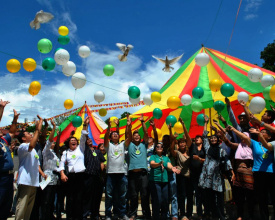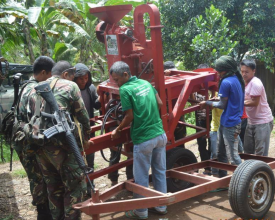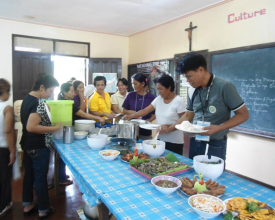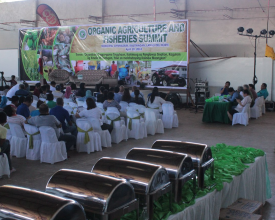
Kauswagan’s “From Arms to Farms” Programme, Philippines
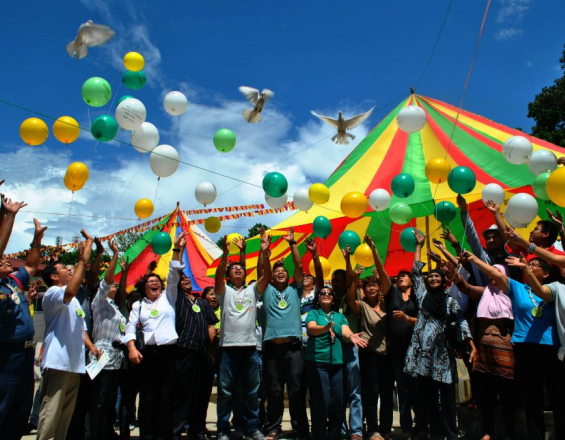
To achieve peace and stability, Kauswagan is addressing the root causes of conflict: food insecurity, poverty, hunger and inequalities. Kauswagan’s From Arms to Farms Programme turned the city from a territory disrupted by decades of war into a platform for sustainable agricultural development. Based on a broad participation of different actors, led by the Local Government Units and other support groups, the programme proved very successful by helping over 600 former combatants to reintegrate into society through farming and by decreasing the rate of poverty in the area to 40 per cent in 2016. The Arms to Farms programme shows that agroecology can be a powerful tool for radical and beneficial changes. For its achievements, Kauswagan’s programme was recognized with an Honourable Mention of the Future Policy Award 2018, awarded by the World Future Council in partnership with FAO and IFOAM – Organics International.
Contexte
Challenges addressed
Kauswagan, Lanao del Norte, located on the Mindanao islands, was a war-torn area devastated by the Moro conflict between Maranaos (Muslim community) and Bisayans (Christian settlers in the area). This conflict has its roots in the old colonialization of the Philippine islands. Colonial policies, encouraged after the Second Word War also by the Philippine government, stimulated the settlement of Christians from the north of the country in the Muslim-prevalent Mindanao. Such displacement left Muslims in Mindanao “minoritized” and fostered discontent about land rights. In the early 1970s, a full-scale armed conflict erupted between the Philippine government and the Moro National Liberation Front (MNLF). The conflict continued throughout the remainder of the 1990s and the 2000s. After numerous attempts to resolve the conflicts, a final peace agreement was signed in 2014. While violence scaled up, also poverty incidence rose up to a level of almost 80% in 2009.
Emplacement
Traiter
Summary of the process
Kauswagan's programme ‘From Arms to Farms: Walking through the Paths of Peace’ is a subcomponent of the Sustainable and Integrated Kauswagan Area Development and Peace Agenda (SIKAD-PA) and how it was developed is particularly important as a strong and broad participation of different actors is one of its key success factors (BB1). Implemented measures of the programme are described in BB2. Together they built Kauswagan's Potential as a Transferable Model (BB3).
Building Blocks
Building a comprehensive community driven plan for peace and development
When Mayor Rommel C. Arnado was elected in May 2010, Kauswagan was still heavily affected by the Moro conflict. The first initiative that the administration made was to understand the causes at the root of the conflict in its community. A multisector technical working group was established and sent out to the remotest areas of the municipality to discuss directly with civilian and fighters. Additionally, several peace workshops were organized in conflict-affected areas. Arnado and his staff came to the conclusion that to achieve peace and stability it was necessary to address food security, poverty, hunger and inequalities. Through this bottom-up approach, a comprehensive community driven plan for peace and development called Sustainable Integrated Kauswagen Development and Peace Agenda (SIKAD-PA) was initiated, of which the From Arms to Farms Programme is a subcomponent.
Enabling factors
The programme is based on a strong and broad participation of different actors. Peace-sensitive and performance-based plans and monitoring systems were set-up to ensure accountability and transparency. Financial management and tax collection reforms were also put in place.
Lesson learned
The Arms to Farms programme shows that agroecology can be a powerful tool for radical and beneficial changes.
Tackling food insecurity and reintegration of former combatants
Kauswagan’s From Arms to Farms Programme is one of the 19 components that frame the strategy of the integrated SIKAD peace agenda. The programme addresses sustainable agriculture and food security while providing for the reintegration of ex-combatants through organic farming. Fighting poverty and increasing food security were prioritized. Organic farming was seen as two-fold tool to develop a resilient agricultural system that does not heavily rely on external inputs and at the same time fosters job creation, providing a source of income for the fighters that surrendered.
At the beginning, 200 rebel commanders as well as farmers were introduced to the programme through a series of meetings and workshops, implemented with help from the Philippine army and the Agricultural Training Institute. A key focus was on capacity building. The local government, together with the Assisi Development Foundation, built a school for agriculture. Once the facility was ready, the local government was able to start supporting ex-combatants and their families, as well as local farmers, to learn how to implement organic and agroecological practices.
Enabling factors
- In order to facilitate access to microcredit and governmental support, the municipality is supporting the creation of Rebel Returnees Associations and their registration as agricultural cooperatives.
- Access to inputs, such as seeds, is also supported through the programme.
- In the last five years, development funding from the central Government has been made available and the Programme now receives between EUR 50,000 to 65,000 every year.
Lesson learned
Without any doubt, the From Arms to Farms Programme has proven successful. No incidents of crime related to armed conflict between Muslims and Christians have been registered in the last four years in the area. Today all rebels active in the area have surrendered and many ex-commanders are now leaders in organic farming and are trying to convince Muslim fighters in other communities to cease fighting and surrender.
Potential as a Transferable Model
One and a half billion people live in fragile, conflict-affected areas. As food and nutrition insecurity become increasingly concentrated in such areas, Kauswagan is a unique example that shows how is possible to solve an on-going conflict by tackling underlying socioeconomic and political issues. The decades-long war between the forces of the government and groups like the Moro Islamic Liberation Front (MILF) left a huge part of Mindanao in poverty.
Other municipalities and regions in the Philippines are now very interested in Kauswagan’s approach and they visit the municipality to study how it managed to break the links between food insecurity and conflict and build a resilient economy, based on agroecological practices and organic farming.
The From Arms to Farms programme received a number of awards, including an international recognition in 2016, when it won the first edition of the United Cities and Local Governments (UCLG) Peace Prize. On that occasion, regional authorities from Guatemala, Colombia and Brazil all expressed interest in replicating Kauswagan’s experience.
Enabling factors
- Tackling underlying socioeconomic and political issues to resolve conflicts.
- Listening to the local people and acting upon their advice was key to the programme's success.
Lesson learned
Solving conflicts is possible if inclusive, participatory approaches are followed and acted upon.
Impacts
Without any doubt, the From Arms to Farms Programme has proven successful. No incidents of crime related to armed conflict between Muslims and Christians have been registered in the last four years in the area. In total, around 600 ex-combatants and their families benefited from the programme. Today all rebels active in the area have surrendered and many ex-commanders are now leaders in organic farming and are trying to convince Muslim fighters in other communities to cease fighting and surrender.
In 2016, the rate of poverty in the area decreased to 40 per cent. Thus the target of significantly reducing the poverty rate from the 70 per cent level of 2009, was met just five years after the inception of the programme. Food production has increased thanks to the fact that 300 ha of previously abandoned land are now cultivated by ex-fighters under organic and agroecological practices. Communities have been positively affected because ex-fighters can now afford to send their children to school.
The local government has adopted a set of resolutions aimed at guarantee long-lasting financial support to sustainable agriculture in the whole municipality. In 2013, the municipality was declared by decree to be GMO and chemical pesticide free.
Beneficiaries
In total, around 600 ex-combatants and their families benefited directly from the programme. Indirectly over 26,000 inhabitants benefitted as no incidents of crime related to armed conflict have been registered in the last four years in the area.
Sustainable Development Goals
Story
Forthcoming

